Regular monitoring of disinformation, especially in the context of civil society, is critically important in situations where propaganda efforts, as in Belarus and Russia, aim to replace and distort commonly accepted concepts and meanings. The publication with data analysis for December 2023 sparked significant interest and discussion, leading to the decision to conduct a similar monitoring for January.
In January 2024, 1043 mentions were collected from 102 sources of online and social media. The distribution of mentions:
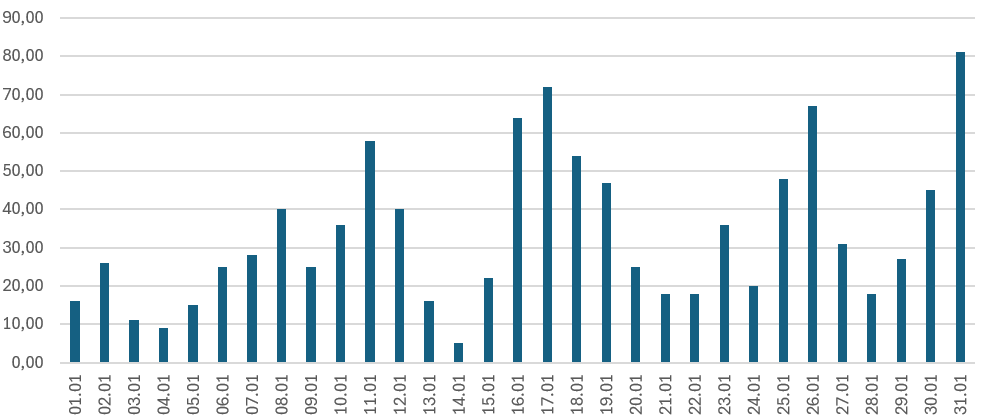
The graph shows weekly peaks in working days and declines in mentions of “civil society” during weekends, with the end of the “New Year holidays” being particularly noticeable.
As in the previous month, Belarusian media with state ownership were selected. The aim of the study was to find evidence of the continued substitution of the concepts of “civil society” and the promotion of the electoral theme – elections*, scheduled for a single voting day on February 25, 2024.
Seven sources were analyzed, including sb.by, belta.by, mlyn.by, gp.by. Most regional state media republished materials from sb.by, belta.by. This may indicate that the Belarusian state information space, which uses definitions subject to revision by the current government, is tightly regulated. The promotion of the stable expression – “subjects of civil society” has begun.
The main themes of the publications were two:
- preparation for the single voting day;
- discussion of the new National Security Concept project.
Some excerpts from January publications that were marked as Red Alert.
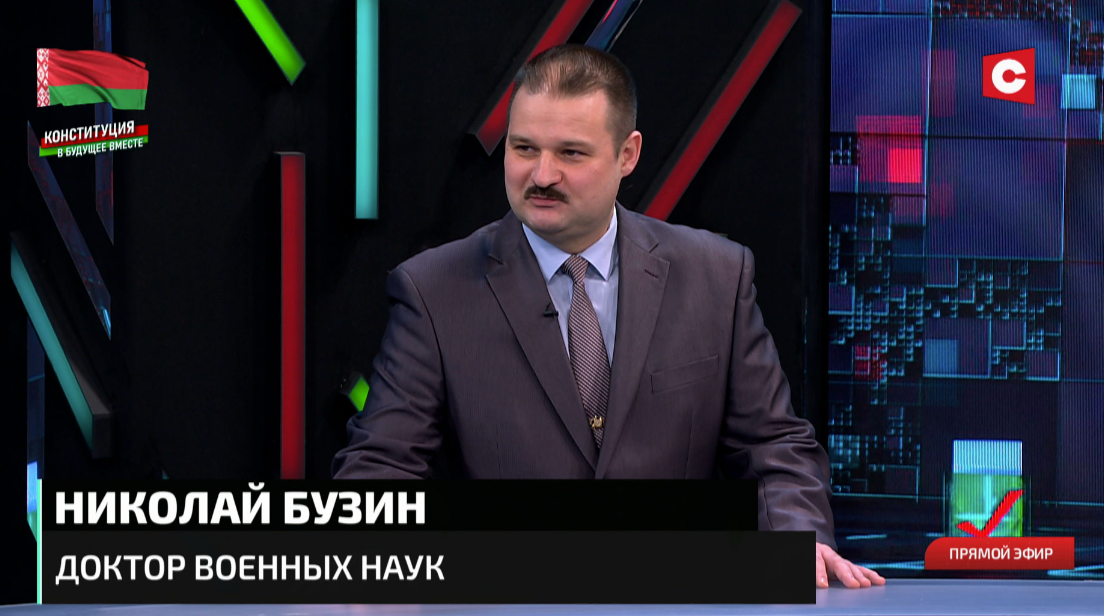
Authored by the candidate for the House of Representatives of the National Assembly of the Republic of Belarus for the Kolasau district № 106 Buzin Nikolai, Doctor of Military Sciences, Professor, Assistant to the Chairman of the House of Representatives of the National Assembly of the Republic of Belarus, an article “What is included in the updated National Security Concept” (Creation and development, not destruction and annihilation – the main guidelines of Belarusian society) was published.
The paragraph about civil society requires special attention:
Additional development within the National Security Concept was given to provisions concerning “civil society”. They are reflected in items 31, 64, and 71 of the document. Thus, in the first, as an internal source of threat to national security in the political sphere, “the insufficient level of development of civil society subjects, meeting national interests, as well as its interaction with state institutions on key issues of the Republic of Belarus’ life” was named. In the second and third, civil society subjects are named as an element of the national security system, their resource is planned to be used for the implementation of the document’s provisions.

Many state publications quoted the comment by the State Secretary of the Security Council Alexander Volfovich on the updated National Security Concept of Belarus:
At the suggestion of representatives of religious confessions, the Belarusian Union of Women, BRSM, and a number of citizens, the updated version of the concept emphasizes the comprehensive protection and preservation of the institution of the traditional Belarusian family as a union between a woman and a man by birth. This excludes various other gender approaches promoted in the West.
Political scientist Alexey Dzermant in the “Meanings” column on the News “24 hours” program on the STV channel spoke about the threats to elections*:
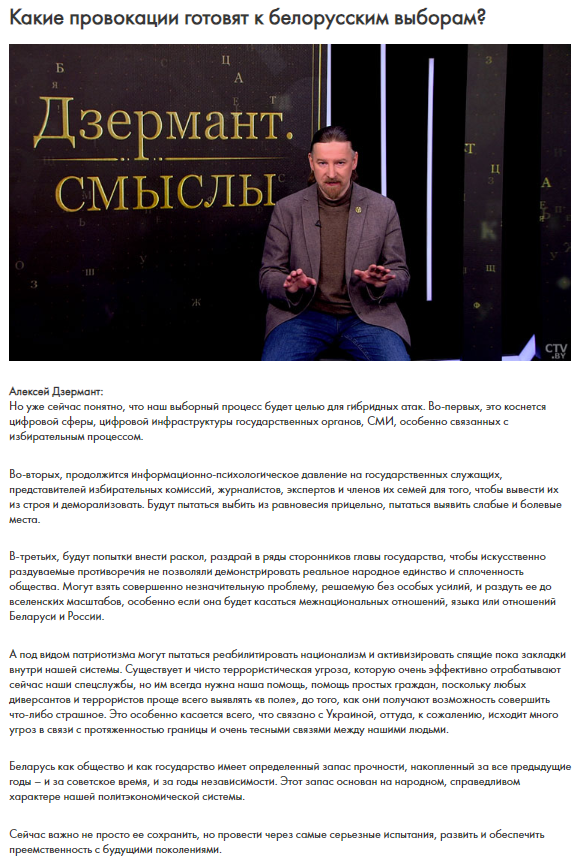
The analysis of the text for signs of disinformation involves evaluating several key aspects, such as the use of vague and manipulative rhetoric, appeals to fear, exaggeration or distortion of facts, and attempts to discredit opponents or create internal discord:
-
Vagueness and generalizations: The author claims that the electoral process “will be a target for hybrid attacks” without specific evidence or examples of such attacks, which can create a general sense of threat without a clear understanding of where it originates from or how it manifests.
-
Appeal to fear: Mentioning “information-psychological pressure”, “terrorist threat”, and “threats…due to the length of the border and very close ties” with Ukraine appeals to fear and uncertainty, trying to mobilize society against external and internal enemies.
-
Exaggeration and distortion: Describing potential threats such as “artificially inflated contradictions” and “universal scale” of minor problems may be an attempt to exaggerate reality to amplify the effect of disinformation.
-
Discrediting opponents: References to “knocking out of balance” and “disabling” members of electoral commissions and journalists may be attempts to discredit or create distrust towards these groups, presented as targets of “hybrid attacks”.
-
Creating discord: Mentioning attempts to “introduce a split” and “discord among the supporters of the head of state” indicates a strategy of creating internal division, which is a classic sign of disinformation campaigns.
-
Idealization of the Soviet Union: The text idealizes “the margin of safety accumulated over all the previous years”, which may be an attempt to strengthen the national narrative and distract attention from current issues.
-
Abstract threats and enemies: Despite mentioning specific countries, such as Ukraine, most of the text contains abstract mentions of threats without clear definitions or evidence, making it a field for speculation and interpretations.
Continued to discredit opponents was the general director of the National Library of Belarus Vadim Gigin: “We bet on peace and creation, the opposition went the way of destruction”
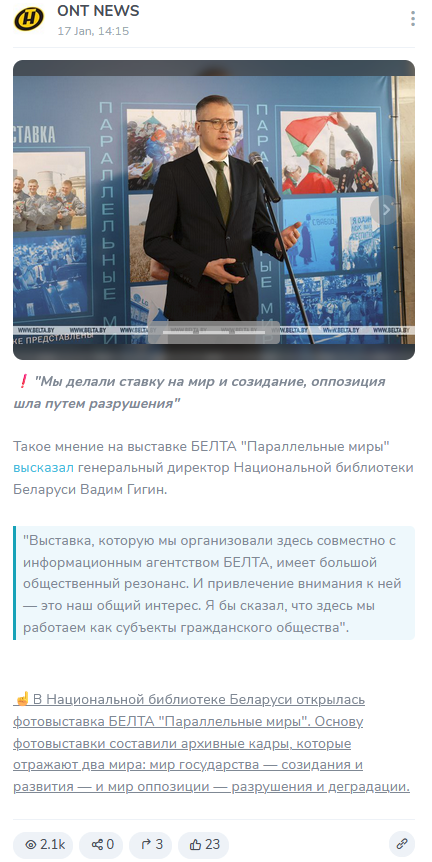
Vadim Gigin is considered one of the most influential participants in the Belarusian state propaganda system.
The current attitude towards international non-governmental organizations was demonstrated by Olga Chemodanova, the head of the ideology department of the Minsk City Executive Committee, clearly following the political conjuncture.

Forum 18 / Forum 18, an NGO highly respected worldwide and a partner of the Norwegian Helsinki Committee, believes that protecting the human rights of everyone, regardless of race, creed, gender, or sexual orientation, is key to ensuring security and prosperity for all. Article 18, Universal Declaration of Human Rights: The freedom of thought, conscience, and religion – including the right to have or not have a religion or beliefs – is therefore one of the fundamental human rights necessary for the dignity of humanity, as well as for justice and freedom for everyone.
The Republican public association “Belaya Rus” acts as an implementor that distributes grants.

According to Oleg Romanov, Chairman of the “Belaya Rus” party, Chairman of the Republican public association “Belaya Rus”; Member of the Council of the Republic of the National Assembly of the Republic of Belarus of the seventh convocation from the Grodno region,
it is very important that funding will also continue for the project “Alley of Memory” in the Brest region. It was initiated by entrepreneur Natalia Ilnitskaya, who has long been among the activists of “Belaya Rus”. The memorial, located in the village of Mukhavets, collects monuments of Red Army soldiers that were dismantled in Poland. Considering that the authorities of Poland and the Baltic states banned the export of monuments and began to destroy them immediately, there was an idea to preserve the memory of them in photographs. Soon, the memorial under Brest will be supplemented with a series of billboards with images of barbarically destroyed sculptural compositions, which until recently could be seen in neighboring countries.
It should be reminded that in Belarus, by the authorities’ initiative, as of October 28, 2022, 13 memory sites of Poles, including military burials, monuments, and memorial signs, were destroyed or desecrated. As part of decommunization in Poland, Soviet monuments are being demolished, but this does not affect burial sites.
Another point to note is one of the three parties that passed re-registration, the Republican Party of Labor and Justice, which on January 10, 2024, presented its candidates for elections*:
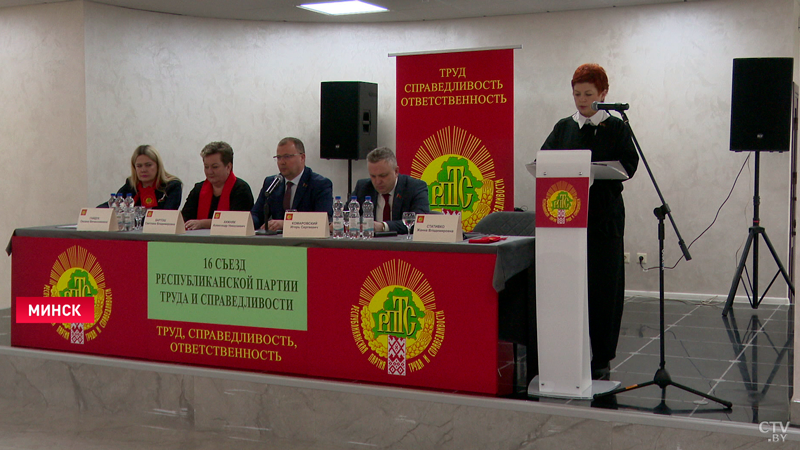
The leadership of this party still includes deputies of the National Assembly of the Republic of Belarus, but the party’s website has no information about the new candidates for elections*. The CTV channel’s material states that this party has 7,000 members, but there are only 49 subscribers to one party Telegram channel and 94 to another.
Another quote:
The upcoming single voting day in February significantly spurred the activity of the country’s civil society. Candidates must prove their right to take a place among the people’s elected representatives. Among the favorites of the pre-election race are experienced, authoritative professionals with a solid portfolio of implemented projects and decades of productive work. At the same time, it is important that legislative bodies are formed from representatives of different age groups

If analogies and nostalgic memories of the Soviet Union arise, then the current electoral campaign of elections* is a typical product of the post-truth era and, in the ideological forms used, a real “cosplay” of Soviet elections and
the generation of bureaucratised terms and communist definitions of the USSR from the 70s-80s of the last century.
Of course, about “Artificial Intelligence”
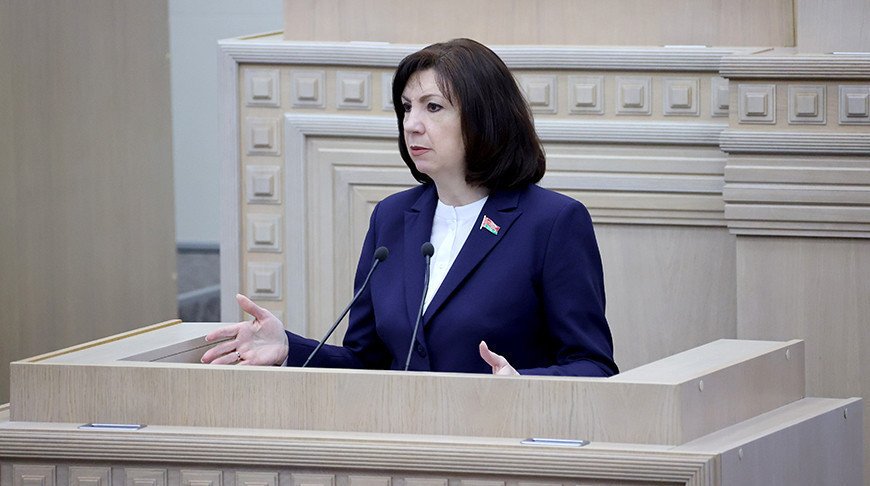
The Chairwoman of the Council of the Republic Natalya Kochanova at a meeting with members of the Youth Council (parliament) at the National Assembly, youth councils (parliaments) at local councils of deputies (Sic!) stated:
Speaking of the potential threat to the information space from artificial intelligence, Natalya Kochanova said: “Every state thinks about how to avoid information attacks. We also must put up a barrier. We need to protect our country”.
In conclusion, the main reasons for the importance of regular monitoring:
- Protecting democratic values: Civil society plays a key role in maintaining democracy, protecting human rights, and promoting civic activity. Disinformation aims to undermine these foundations, creating a false perception of the motives and actions of civil society organizations.
- Preventing polarization: Propaganda often uses disinformation to ignite social and political division. Through regular monitoring, false claims can be identified and corrected before they have a chance to shape public opinion.
- Maintaining public trust: Disinformation undermines trust in civil society institutions, governmental bodies, and the media. Regular monitoring and debunking false information help restore and maintain this trust.
- Ensuring information security: In the context of information warfare, disinformation can be used as a weapon against the state and its citizens. Monitoring allows for timely response to threats and protection of public welfare.
- Supporting independent journalism and research: Regular monitoring provides independent media and research groups with accurate information necessary for analytical articles and reports that contribute to transparency and support for civil society.
- International cooperation: In the era of globalization, disinformation is not limited by national borders. International monitoring and information exchange contribute to the creation of effective strategies to counter disinformation on a global level.
In the context of Belarusian and Russian propaganda, deliberately distorting the concept of civil society, regular monitoring is not just a tool for protection but a necessity for preserving the foundations of democracy, protecting rights and freedoms of citizens, and maintaining stability in society.


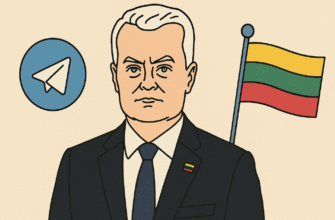



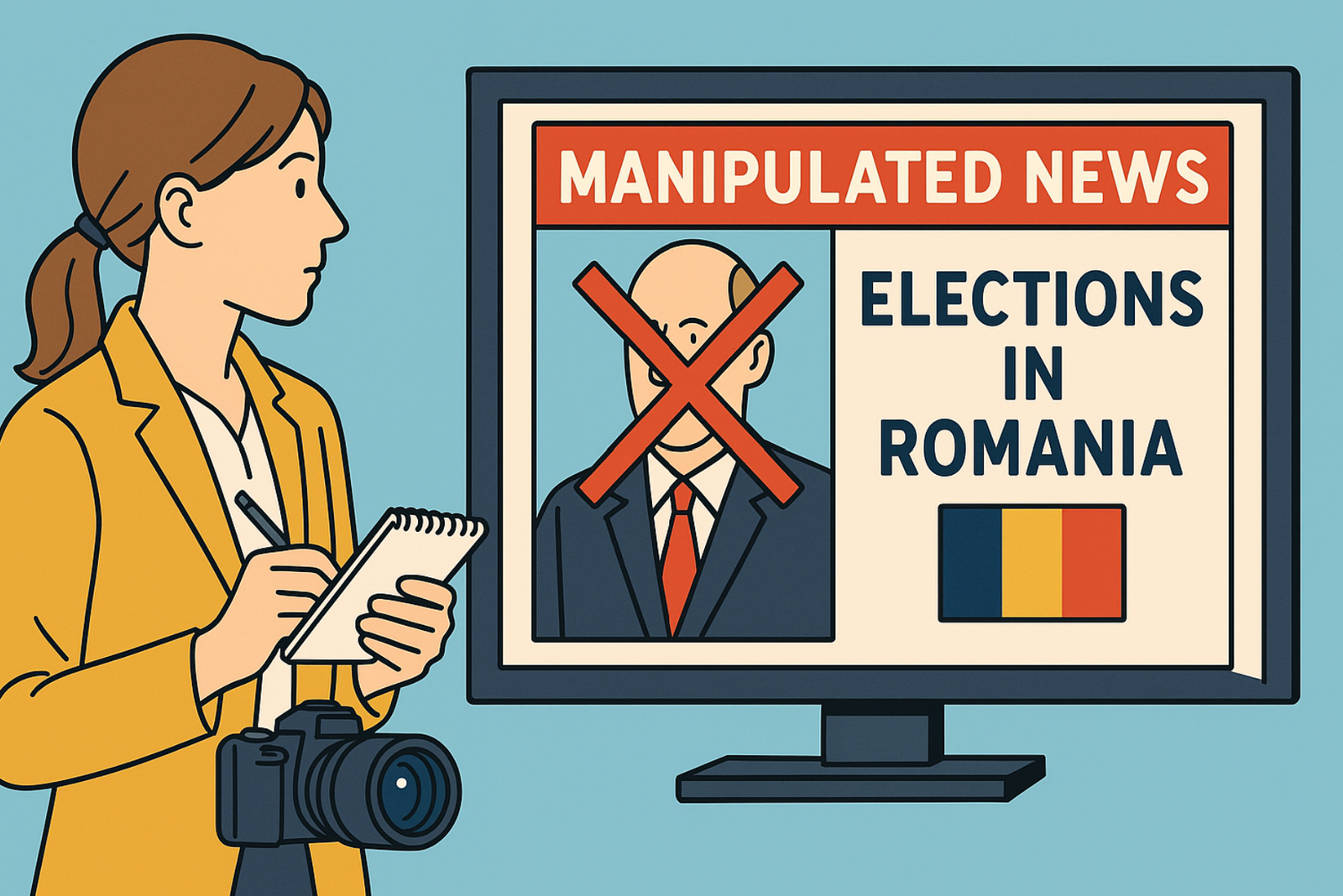



Comments are closed.